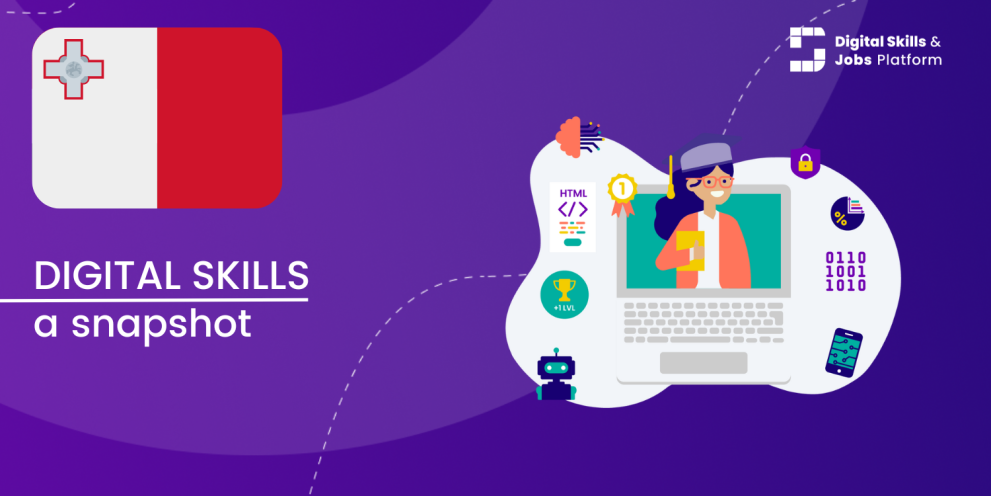Malta: a snapshot of digital skills

Introduction
In the 2024 edition of the Digital Decade report, Malta has achieved 63,0% basic digital skills coverage, growth comparing to 61,2% in 2023 and way above the EU average of 55.6%.
According to the Digital Decade report 2024, Malta performs slightly below the EU average in the indicator - percentage of ICT specialists in employment, with a drop from 5,0% in 2023 to 4,7% in 2024 Malta is now performing below the EU average of 4.8%.
In 2022 Microsoft's Digital Futures Index measureed the digitalization level of 16 European countries, including Malta. Digitalization is perceived through five categories of digital development: Digital Business, Digital Government and Public Sector, Digital Infrastructure, Digital Sector, and Human Capital. The Index brings data about the current level of digitalization of the country and detects the most successful areas, but also the areas where there is more work to be done to accelerate the digital transformation process. The overall level of Malta’s digital development is 114, which is 14% above the CEE average and 25% below frontrunner average. Compared to the Central and Eastern European countries, Malta is ranked above average in all categories, with the highest score in Digital Business (122.46) and lowest in Digital Government and Public sector (100). Marta is ranked below average if compared with frontrunner countries (Finland, Denmark, Sweden and Netherlands). ked below average if compared with frontrunner countries (Finland, Denmark, Sweden and Netherlands).
eSkills Malta Foundation was established by the Maltese Government in 2014 with the Ministry for Education and Employment, the Malta Information Technology Agency, the Malta Communications Authority, the Malta Enterprise, The Malta Gaming Authority and The Malta Chamber of Commerce Enterprise and Industry as the founding members. The Foundation is a National Coalition made up of various representatives from Government, industry and education, who can contribute to the increase in digital skills and the development of the IT profession. The Foundation is advising Government and relevant stakeholders on matters related to eSkills policies, contributing to the expansion of ICT educational programmes and related formative initiatives, leading ICT professionalism development programme; initiating further reform of ICT educational offerings and contributing to the ICT education community's capacity-building and promote the Maltese eSkills potential locally and internationally.
Overview of state strategies and national initiatives
State strategies
The National eSkills Strategy for 2022-2024 includes actions and recommendations directed at education, society, the labour force, and ICT professionals. Promoting the inclusive and equitable development and application of fundamental, advanced, and specialised digital skills is emphasised. It encourages collaboration between the public and private sectors in an effort to align education programmes with market demands and guarantee coherence among all initiatives in Malta pertaining to digital skills. The strategic pillars Education, Society, the Workforce, and ICT professionals are the same as those outlined by the European Coalition for Digital Skills and Jobs. Several common governance enablers are required to assure the effectiveness of the Strategy and its implementation across the four strategic pillars. They pertain to Collaboration, leadership and shared responsibility, benchmarking, funding, and strategic alignment with a concentrated focus.
Malta's Smart Specialisation Strategy 2021- 2027 identifies digital technologies as one of the priority areas for investment in innovation over the coming years, prioritising investment in innovative digital technologies in the areas of AI, IoT, high performance computing, distributed ledger technologies, cybersecurity, chatbots and digital games.
As part of the National Employment Policy 2021-2030, the government intends to equip its workforce with in-demand skills and is initiating a new national skills census to identify skills gaps on the Maltese labour market and develop targeted responses.
Malta the ultimate AI Launchpad – A Strategy and Vision for Artificial Intelligence in Malta 2030 – has been built on three strategic pillars Investment, start-ups and innovation; Public and Private sector adoption; which are enabled by education and workforce, establishment of national AI certification programme to provide ethically aligned transparent and socially responsible AI solutions; and ecosystem infrastructure.
National initiatives
Malta’s recovery and resilience plan supports the digital transition with investments and reforms in the public and private sectors. Including investments into digitalisation of the public administration and public services (€34 million) to strengthen the government’s IT systems and enhance digital public services. It also invests in the digitalisation of at least 360 companies, in particular SMEs (€15 million). Reforms include the adoption of Malta’s Digital Strategy 2021-2027, which aims to reduce the digital divide, notably by supporting families with low income to get connected and have access to computers, and to promote digital skills.
The Maltaverians Comics Project publishes a series of comics focused on digital innovation technology aiming to emphasize the importance of expanding teens’ knowledge in this rapidly evolving field. These comics will be disseminated to students majoring in Computing and IT to improve their understanding of the most recent technologies and potentially guide them towards future careers. It will also be available online in digital format, with supporting glossary of technological terms and concepts. The comics imagery and narratives are created to stimulate the interest of young readers and foster a deeper understanding of the innovative technologies.
Women in ICT initiative is comprised of like-minded individuals from the ICT industry or organisations that use ICT in order to enhance women's participation in Malta's digital economy. The proposed objectives of the group are: Increase the participation in the Digital industry or digital-related industry by girls and women; Having access to equal opportunities in taking advantage of the digital opportunities Increases on the Quality of Resources for the ICT Industry; Discuss Gender issues at the place of work in the digital environment and propose possible solutions and Contribute to Policy to stakeholders.
Funding opportunities
Funding opportunities for upskilling and reskilling to support the digital competences of individuals and organizations are available in form of loans, grants and financial instruments. For the period 2021 – 2026 most of the activities in digital transformation are financed through Recovery and Resilience facility but also as activities in Horizon, Erasmus+, ESIF and EEA grant schemes. You may find more on the page of eSkills Malta Foundation and in the article on the Digital Skills and Jobs Platform.





